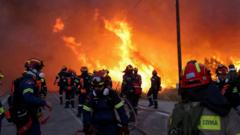Cities prepare for a prolonged heatwave, with emergency services on alert for potential heat-related issues.
Southern Europe Faces Early Heatwave with Extreme Temperatures

Southern Europe Faces Early Heatwave with Extreme Temperatures
Health and fire warnings are issued as temperatures soar above 40C across southern Europe.
Southern Europe is currently experiencing an alarming heatwave, with warnings in place across multiple countries due to soaring temperatures expected to exceed 40C this weekend. Nations like Italy, Greece, France, Spain, and Portugal are among the most affected, with the city of Seville in Spain predicted to reach a scorching 42C.
The extreme heat is being driven by hot air masses originating from North Africa, spreading across the Balkans and impacting popular holiday spots, such as Croatia. According to BBC Weather, this heatwave is particularly intense for this time of year, as such high temperatures are typically seen in July and August.
In Spain, emergency response teams are on standby to assist with an anticipated rise in heatstroke cases, particularly affecting vulnerable populations, including children, the elderly, and individuals with existing health conditions.
In Italy, residents of key cities like Rome, Milan, and Venice, where numerous celebrities have congregated for a high-profile wedding, are advised to stay indoors during the peak heat hours from 11:00 to 18:00 local time. France has been facing heat challenges for over a week, leading to orange heat alerts for southern regions. In Marseille, municipal pools are being made available free of charge to provide relief from the oppressive heat.
Meanwhile, the United Kingdom is also feeling the effects, with yellow and amber warnings in place as temperatures could rise to 32C. This heatwave is expected to persist until Tuesday evening.
Already, wildfires have ravaged parts of Europe, particularly in Greece, where coastal towns around Athens have seen devastating fires that prompted evacuations. While it is challenging to attribute specific weather events to climate change, heatwaves of this nature are becoming increasingly likely and severe due to its effects. Research from World Weather Attribution indicates that heatwaves in June featuring three consecutive days over 28C are currently ten times more probable than in pre-industrial times.




















